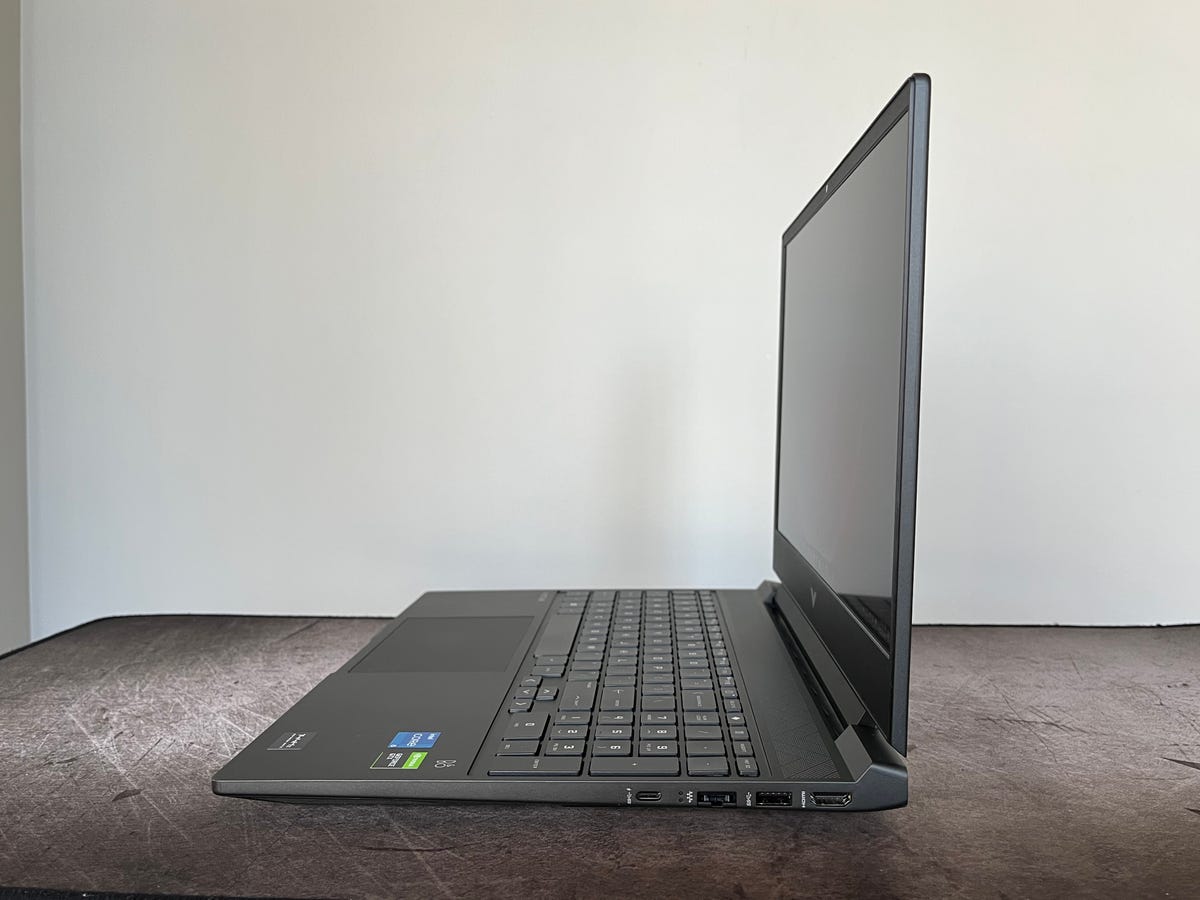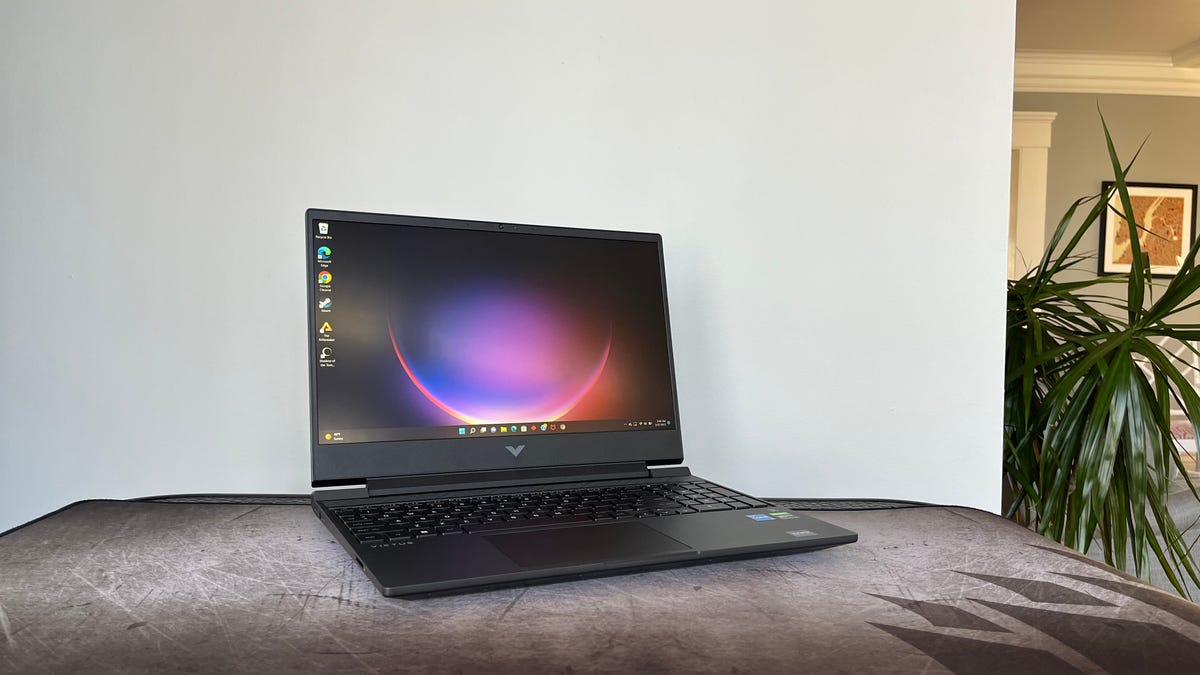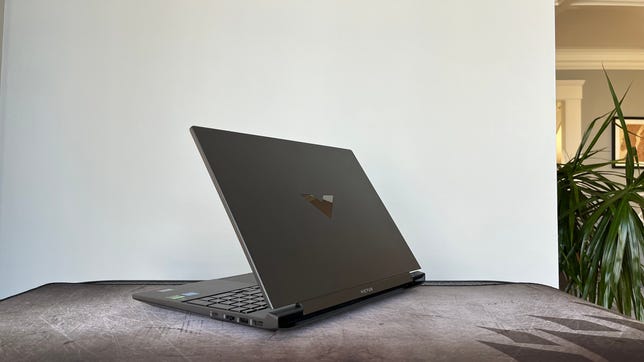There are two types of budget gaming laptops: Ultralow-cost models well under $1,000 with entry-level Nvidia GeForce GTX graphics and models priced between roughly $1,000 and $1,200 equipped with a low-end GPU from the superior GeForce RTX series. The HP Victus 15 is solidly in the former category. It costs $800 at Best Buy and can frequently be found on sale for as little as $580. It’s based on a 15.6-inch, 1080p display with a 144Hz refresh rate and powered by an Intel Core i5-12450H CPU, 8GB of RAM and GeForce GTX 1650 graphics.
I wouldn’t pay $800 for a laptop with a midrange Core i5 CPU, a meager 8GB of RAM and an aging GTX 1650 GPU because you can usually find a budget model with a better CPU, twice the RAM and — most importantly — an RTX 3050, 3050 Ti or even 3060 GPU on sale for less than $1,000. So, the question becomes, is the Victus 15 a good buy when it’s on sale for less than $600? At that price, it begins to make sense for those just dipping their toes into the 3D-gaming waters and looking to play older or more casual games rather than rocking the latest AAA titles with ray tracing and other quality settings dialed up.
Like
- Ultralow price for gaming laptop
- Speedy 144Hz display
- Decent battery life
Don’t Like
- Dim display
- Grainy 720p webcam
- Keyboard lacks RGB lighting
Enough 3D performance for some
Our Victus 15 test system (model 15-fa0031dx) has been available at Best Buy for nearly a year and is based on an Intel Core i5-12450H CPU and GeForce GTX 1650 graphics. Released at the beginning of last year, the 12th-gen Alder Lake CPU is relatively new. While some high-end, high-priced laptops have been released with 13th-gen Raptor Lake CPUs, we’ve yet to see a lower-end model based on a mainstream 13th-gen Core i5 or Core i7 chip. The Victus 15’s GPU is another story. The GTX 1650 was released nearly four years ago and has been surpassed by three generations of GeForce RTX graphics processors.
The only place you’ll find the GTX 1650 GPU these days is in not just a budget gaming laptop but an entry-level budget gaming laptop. You really can’t drop down a level without entering integrated graphics territory. That said, this four-year-old GPU isn’t entirely useless. While it will struggle with the latest, most demanding AAA titles, it’s more than capable of playing most games at 1080p at medium to high settings.
HP Victus 15 gaming laptop
| Price as reviewed | $800 |
|---|---|
| Display size/resolution | 15.6-inch 1,920×1,080 144MHz 16:9display |
| CPU | 2GHz Intel Core i5-12450H |
| Memory | 8GB DDR4 3,200MHz RAM |
| Graphics | 4GB Nvidia GeForce GTX 1650 Graphics |
| Storage | SamsungMZVL2512HCJQ 512GB SSD |
| Networking | Wi-Fi 6 MT7921 (2×2) and Bluetooth 5.3 |
| Operating system | Windows 11 Home 21H2 |
For casual gamers looking to play around with co-op shooters, the Victus 15 is a cheap way to get there. We experienced smooth gameplay at 1080p on both CS:GO and Riftbreaker. The laptop averaged 105 frames per second on the Riftbreaker GPU benchmark and an even more impressive 191fps on the CS:GO benchmark. Both tests were run at 1080p with High settings enabled. It also achieved a playable 61fps on the newer and more demanding Guardians of the Galaxy — also at 1080p and High settings.
On our Shadow of the Tomb Raider test (1080p with Highest settings), however, it dropped to 46fps. When we dialed back the detail settings to High, the Victus 15 averaged 53fps. It was able to surpass 60fps only when we dropped the settings to Low, where it averaged 73fps. (It got close at Medium settings, with an average frame rate of 58fps.)
Gaming laptops rarely, if ever, deliver long battery life, so all we are looking for from such a machine is a passable runtime. And the Victus 15 delivers just that. It lasted for nearly 6.5 hours on our demanding streaming video battery-drain test, which placed it in the top half of the other budget gaming laptops we are using for comparison in this review. Don’t plan on getting anywhere near that if you’re gaming, though.


Plastic chassis, dim display
There’s certainly a limit to its 3D performance — not a surprise with an $800 gaming laptop that’s frequently on sale for less than $600. The laptop’s design doesn’t overcome its budget price, either. The all-plastic, all-black body is a bit flimsy but not too bulky. It’s a hair less than an inch thick and weighs just over 5 pounds. The display hinge isn’t quite tight enough, causing the display to wobble at the slightest nudge. Some flex can be felt with the plastic keyboard deck under your fingers when you are typing and particularly when mashing keys during a game. The plastic lid protecting the display also flexes a bit too much for my comfort.


The keyboard feels cramped because HP decided to squeeze in a number pad. The keys have snappy response but lack RGB backlighting, a fun feature offered on nearly every gaming laptop. I wasn’t expecting per-key or even multizone RGB lighting, but the Victus 15 offers neither R nor G nor B — nor any other color than white. You get the bare minimum of keyboard backlight — one-level white lighting.


The display offers a crisp, full-HD image across the 15.6-inch panel along with a speedy 144Hz refresh rate but is rated for only 250 nits of brightness. That’s typical of budget laptops, but I measured a peak brightness of only 220 nits. Games and images looked a bit dull, even at max brightness. The 720p webcam, too, is underwhelming. It produces a grainy, poorly balanced image compared with that of 1080p cams that have quickly become the norm.
Affordable fun for a first gaming laptop
Do you remember your first car? Unless you were born into the 1%, it was likely on the level of a Ford Taurus that could receive a dent or two without your parents getting upset. It’s also likely you recall that dented Taurus fondly. You made great memories in that car, because you and your friends had the ability to cruise around without a parent at the wheel. The Victus 15 is that beloved Ford Taurus. It’s not the sleekest or fastest gaming laptop, but it’s an inexpensive rig that you can afford right now. You could keep saving for a pricier gaming laptop that would deliver greater gaming capabilities and more bells and whistles than the Victus 15, but the Victus 15 will let you start making fond memories online with your friends right now.
The Victus 15 can regularly be found on sale at Best Buy for less than $600. For first-time gamers, it makes sense at this price. If it’s selling at its full price of $800, however, then budget gaming laptops in the form of the Acer Nitro 5 or Dell G15 are better buys. Or you could check out this RTX 3050-based Victus 15 model available directly from HP that is regularly discounted. Each cost less than $1,000 (and can be frequently found discounted closer to $800) and feature RTX 3050 or RTX 3060 graphics for better 3D gaming performance than the Victus 15 and its aging GTX 1650 GPU.
How we test computers
The review process for laptops, desktops, tablets and other computer-like devices consists of two parts: performance testing under controlled conditions in the CNET Labs and extensive hands-on use by our expert reviewers. This includes evaluating a device’s aesthetics, ergonomics and features. A final review verdict is a combination of both objective and subjective judgments.
The list of benchmarking software we use changes over time as the devices we test evolve. The most important core tests we’re currently running on every compatible computer include: Primate Labs Geekbench 5, Cinebench R23, PCMark 10 and 3DMark Fire Strike Ultra.
A more detailed description of each benchmark and how we use it can be found in our How We Test Computers page.
Geekbench 5 (multicore)
Note:
Longer bars indicate better performance
Cinebench R23 (multicore)
Note:
Longer bars indicate better performance
3DMark Wild Life Extreme
Note:
Longer bars indicate better performance
Guardians of the Galaxy (High @1920 x 1080)
Note:
Longer bars indicate better performance
Online streaming battery drain test
Note:
Longer bars indicate better performance
System Configurations
| HP Victus 15 Gaming Laptop | Microsoft Windows 11 Home; 2GHz Intel Core i5-12450H; 8GB DDR4 3,200MHz RAM; 4GB Nvidia GeForce GTX 1650 GPU; 512GB SSD |
|---|---|
| Acer Nitro 5 AN515-58 | Microsoft Windows 11 Home; 2.5GHz Intel Core i5-12500H; 16GB DDR4 3,200MHz RAM; 6GB Nvidia GeForce RTX 3060 GPU; 512GB SSD |
| Dell G15 5520 GSeries | Microsoft Windows 11 Home; 2.5GHz Intel Core i5-12500H; 8GB DDR5 4,800MHz RAM; 4GB Nvidia GeForce RTX 3050 GPU; 256GB SSD |
| Acer Nitro 5 AN517-42 | Microsoft Windows 11 Home; 3.3GHz AMD Ryzen 7 6800H with Radeon Graphics; 16GB DDR5 4,800MHz RAM; 6GB Nvidia GeForce RTX 3060 GPU; 1TB SSD |
| Dell G16 7620 GSeries | Microsoft Windows 11 Home; 2.3GHz Intel Core i7-127000H; 16GB DDR5 4,800MHz RAM; 6GB Nvidia GeForce RTX 3060 GPU; 512GB SSD |
| Lenovo IdeaPad Gaming 3 15ARH7 | Microsoft Windows 11 Home; 3.3GHz AMD Ryzen 5 6600H with Radeon Graphics; 8GB DDR5 4,800MHz RAM; 4GB Nvidia GeForce RTX 3050 GPU; 256GB SSD |

